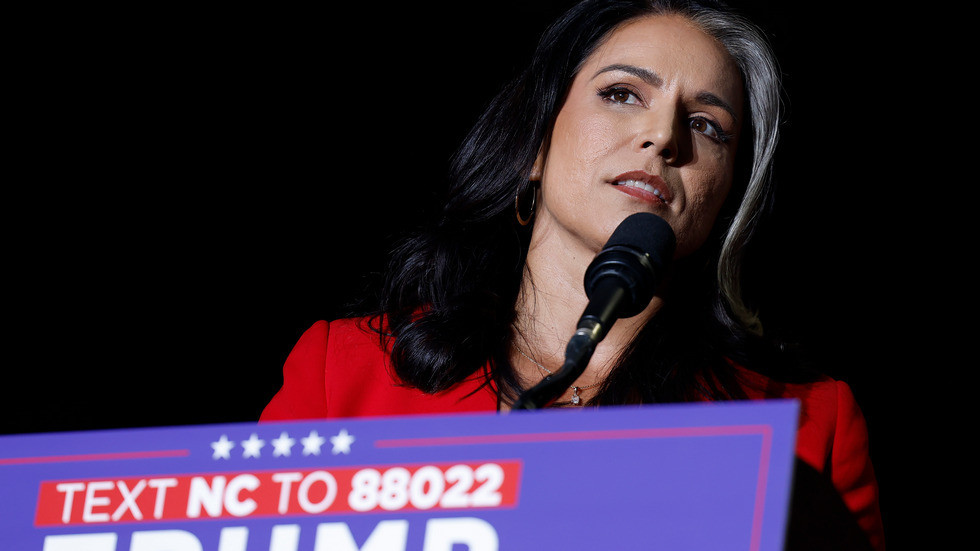Tulsi Gabbard, the former Democratic congresswoman and presidential candidate, has notably shifted her political allegiance by endorsing Donald Trump and officially joining the Republican Party. Gabbard, who once advocated for progressive values and was a vocal critic of U.S. military involvement abroad, declared that the Democratic Party has become an institution dominated by elitist interests promoting war and censorship. Her departure from the Democrats in 2022 was fueled by her perception of the party’s increasing deviation from its roots. At a recent rally in North Carolina, Gabbard’s endorsement of Trump signaled a significant ideological shift, as she praised his leadership for transforming the GOP into a party focused on peace and common sense.
In her remarks at the rally, Gabbard positioned herself alongside Trump as she criticized the Democratic Party, which she claims has become “unrecognizable” in its allegiance to various issues that she finds contrary to American values. She accused the party of being anti-freedom and pro-war, asserting that their current stance leads the nation closer to military conflict. Gabbard expressed her belief that Trump represents a different path, one that seeks to conclude wars rather than instigate new ones. This endorsement of Trump signals not only a personal transformation for Gabbard but also highlights a fracture within American political ideologies, particularly the growing divergence between traditional Democratic views and the emerging Republican narrative under Trump’s leadership.
Gabbard’s criticisms were particularly directed at Vice President Kamala Harris, whom she branded as a significant contributor to escalating tensions with Russia. She claimed that Harris’s foreign policy decisions, particularly regarding Ukraine and NATO, have placed the United States in a precarious position, edging closer to potential global conflict. Gabbard’s assertion that Harris is the “main instigator” in this sphere underscores her emerging role as a commentator on foreign policy within the GOP, mirroring Trump’s own stance on seeking a ceasefire and reducing military tensions. This alignment with Trump enhances her credibility among Republican supporters, who have increasingly become skeptical of government military interventions.
In framing her current political identity, Gabbard declared that she is joining a party committed to the common people and characterized by moral courage—qualities that she believes Trump embodies. Her decision to support Trump signals a broader trend of disillusioned Democrats gravitating toward a Republican identity that prioritizes peace and diplomacy over conflict. This transition has placed Gabbard at the intersection of two diverging political expressions, as she calls for a return to foundational American principles of freedom and common sense. Her view of the GOP as a party that champions these ideals stands in stark contrast to her previous associations with Democratic policies.
As Gabbard advocates for a political climate focused on unity and peace, she positions herself as a unique voice within the Republican Party, diversifying its base and appealing to disaffected former Democrats. This newfound alignment with Trump and GOP ideologies raises questions about the evolving landscape of American political thought. Gabbard’s critique of current Democratic policies and her uncompromising stance on foreign relations serve as a call to action for constituents who yearn for different diplomatic strategies. In emphasizing that the party’s leadership has the strength to pursue peace, she aligns herself with a growing faction within the Republican Party that seeks to distance itself from traditional foreign intervention strategies.
Overall, Tulsi Gabbard’s endorsement of Donald Trump symbolizes a significant ideological realignment within U.S. politics. Her criticisms of the Democratic Party and its leading figures, particularly concerning foreign policy decisions, reflect a broader discontent among some of its former members regarding the party’s direction. This moment represents a potential shift in Republican identity as Gabbard champions a narrative of peace, common sense, and populism—qualities she believes align closely with Trump’s vision for the future of America. As she continues to engage with her new party and its supporters, Gabbard’s emerging role will likely influence the discourse around foreign policy, unity, and the essential values that define American democracy.

